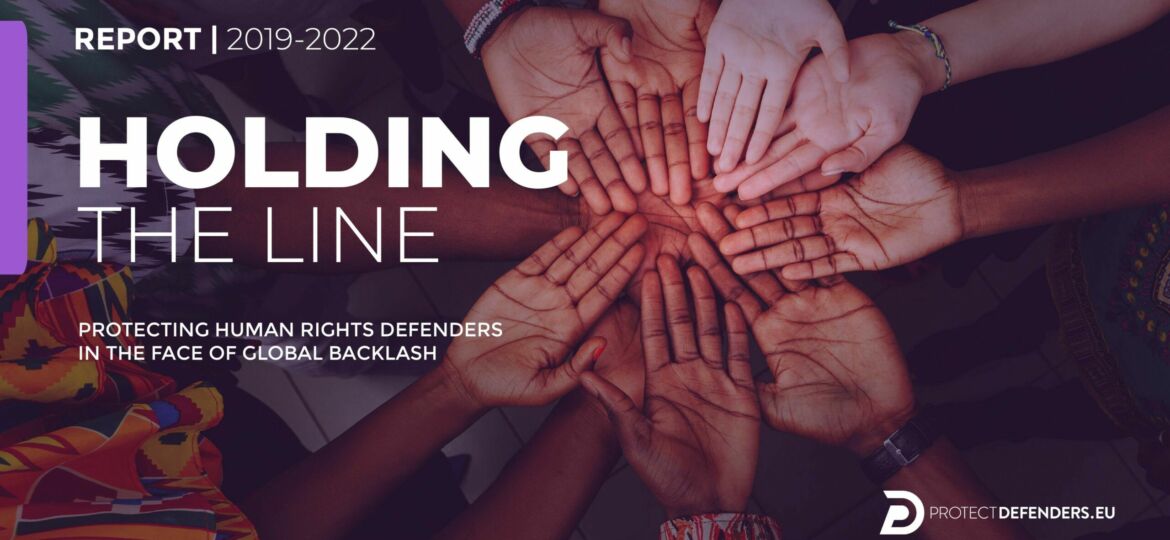
The challenges faced by HRDs globally can be exacerbated by regional and national trends that impact the operating environment for HRDs, affecting the implementation of action plans and strategies aimed at protecting their rights. From Latin America to Africa, Asia to Europe, these trends highlight the complex and evolving landscape in which HRDs operate, and the ongoing efforts needed to support and protect their vital work.
This article is part of a series of articles published in conjunction with the report, providing complementary information. You can read the full report “HOLDING THE LINE – PROTECTING HUMAN RIGHTS DEFENDERS IN THE FACE OF GLOBAL BACKLASH” here.
The situation for HRDs in Europe and Central Asia has been deteriorating over the past three years. The full-scale invasion of Ukraine by Russia and war in the country, but also the severe crackdown on civil society in Belarus, have led to massive human rights violations and a strong backlash against civil society, including harassment of human rights defenders, violence, risk of torture, disappearance. In the rest of the region, civic unrest spread throughout the period 2019-2022 in the whole region, leading to the violent repression of human rights defenders and protesters with excessive and lethal force, criminalization and internet shutdowns.
Throughout the region, HRDs working to expose human rights violations, corruption, and growing authoritarianism faced criminalization, arbitrary arrest and detention, torture, surveillance, physical attacks, and death threats. Those focusing on environmental rights, LGBTIQ+ communities, women, refugees, and migrants were particularly vulnerable.
In the Russian-occupied territories of Ukraine, HRDs were disproportionately targeted by the Russian Armed Forces for documenting and communicating evidence of human rights atrocities. Many HRDs were abducted, forcibly disappeared, unlawfully detained, and subjected to torture and other forms of mistreatment.
The harassment of human rights lawyers in Crimea continued, including raids, prosecution, and a number of threats. Crimean Tatars, an ethnic minority group, were targeted, and lawyers representing and defending their rights faced persecution.
Inside Russia, the crackdown on the human rights movement and dissent continued and increased following the invasion. The expanded foreign agents law is being used to penalize civil society, resulting in the forced closure or fines imposed on human rights organisations such as the Human Rights Centre (International Memorial), the “Sphere” Foundation, Human Rights Watch, Amnesty International, and the Moscow Helsinki Group. Independent media and journalists are also targeted to prevent reporting on the anti-war movement and human rights violations.
In Belarus, an unprecedented human rights crisis marked by widespread violations, violence against protesters, enforced disappearances, allegations of torture, and harassment of civil society actors, erupted after the disputed presidential elections in August 2020, which led to mass protests against the government. Since then, the government has been using the judicial system to suppress protests and criminalize HRDs through repeated arrests, detentions, and trumped-up charges. HRDs faced retaliation for their work, including torture and inhuman treatment. Maria Rabkova, a HRD and member of HRC Viasna, was sentenced to 15 years in prison for documenting torture and human rights violations during the 2020 protests. Leaders of Viasna, Ales Bialiatski, Valiantsin Stefanovich, and Uladzimir Labkovich, faced arbitrary detention and unfair trials.
Central Asian countries, including Kazakhstan, Kyrgyzstan, and Tajikistan, have experienced civic unrest, leading to the violent repression of HRDs and protesters, excessive use of force, criminalization, and internet shutdowns. The authorities in Kazakhstan and Tajikistan justified their actions using “counter-terrorism” rhetoric. In Kazakhstan, protests against energy price increases were brutally suppressed, resulting in deaths and judicial harassment of HRDs and journalists. In Tajikistan, protests against police brutality were met with excessive force, leading to fatalities, detentions, internet shutdowns, and unfair trials of HRDs.


